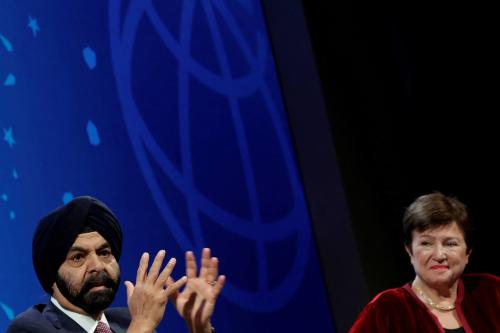Editor’s Note: Discounted by many observers only a year ago, the International Financial Instiutions (IFIs) have been bolstered by support of the G20 process. In an interivew with Andrew F. Cooper of CIGI, Domenico Lombardi discusses how the G20 can be used as catalyst for reform within international finance.
Andrew F. Cooper: The G20 is often called a “crisis committee”. What is your assessment of that phrase?
Domenico Lombardi: I think at present times, it is a very well pointed definition. The G20, until last year, was a sort of think-tank group where representatives from various ministries and central banks from systematically important countries, would discuss relatively important issues. But it is with the advent of the breaking of this crisis, the G20 really was brought to the fore as a sort of crisis committee. Why is that? Certainly because in the G8 does not include anymore in its membership all the countries that account for the global macroeconomic disturbances that we are going through. And the G20 of course does include all those members. And of course it is much more suitable than the G8 to discuss issues of broader macroeconomic relevance.
Cooper: Do you have any sense about the core agenda? What should the G20 focus on?
Lombardi: I think the G20 is very cleverly forging an important and interesting agenda. On the one hand, it is discussing how G20 countries can deal directly with this crisis, in terms of macroeconomic response to the crisis, in terms of how to improve financial regulation to the crisis. And this of course is a leg of a broader response that the G20 is crafting. There is also a multilateral leg to this broader G20 strategy, and it has to do with the reform of the IFIs, in particular with the IMF and the World Bank. We know that the G20 have set up various working groups, dealing with multilateral institutions. They have already delivered their reports. Their comminques have referred to, in several important ways, reforming multilateral institutions, they have referred to the need to having an open merit based selection of the leadership of the multilateral institutions. And therefore the G20 is really starting to play a very fundamental role. Of course, on the one hand, the G20 will be asking for more and more reforms from the multilateral institutions. But at the same time the G20 will also, and is already providing a lot of political capital to these institutions and this is of course an important condition that allows the G20 to be a catalyst for reform of multilateral institutions.
Cooper: One of the unanticipated aspects of the crisis is how the IMF has come back, in terms of its exposure, in terms of its projection, in terms of its resources. What is your assessment of the IMF playing out from the crisis?
Lombardi: Until a year ago the IMF was considered by almost everybody, within and outside the IMF, irrelevant. As we know at the London Summit, the IMF was given much more capital, many more resources than it had hoped for. Of course it’s not just a matter of how many resources the IMF was promised at the London Summit, but it’s especially the political support that the leaders of the G20 were willing to provide to the IMF. That’s really the key point, the key break with respect to the past, and I think that if leaders from G20 countries will keep providing this political capital to the IMF we will be moving towards a better multilateral system.



Commentary
The G20 and Political Capital for the International Financial Institutions
July 7, 2009